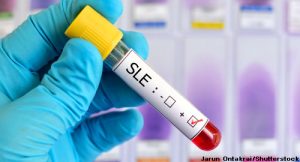 Mitochondrial damage-associated molecular patterns stimulate innate immune response. It appears that adaptive immune response may also recognize mitochondria, but the specifics of the recognition are unclear. Although research has found anti-mitochondrial antibodies (AMAs) are common in patients with systemic lupus erythematosus (SLE), little is known about the association between different types of AMAs, such as anti-whole mitochondria antibodies (AwMA) and anti-mitochondrial DNA antibodies (AmtDNA), and SLE’s clinical characteristics.
Mitochondrial damage-associated molecular patterns stimulate innate immune response. It appears that adaptive immune response may also recognize mitochondria, but the specifics of the recognition are unclear. Although research has found anti-mitochondrial antibodies (AMAs) are common in patients with systemic lupus erythematosus (SLE), little is known about the association between different types of AMAs, such as anti-whole mitochondria antibodies (AwMA) and anti-mitochondrial DNA antibodies (AmtDNA), and SLE’s clinical characteristics.
Recent research suggests these different mitochondrial components are immunogenic in SLE patients. The findings by Yann Becker, a graduate student of microbiology-immunology at the Universite Laval, Canada, and colleagues are consistent with the understanding that extracellular mitochondria may be an important source of circulating autoantigens in SLE patients. The authors published their work online March 14 in Scientific Reports.1
The growing focus on the role of mitochondria in autoimmune disease has led to an increased desire to isolate high-quality, pure mitochondria. The researchers were able to isolate and work with purified mitochondria that were homogeneous in size and retained their canonical morphology when observed in electron microscopy. Due to a high yield of pure mitochondria isolated from murine liver, the investigators used the whole mitochondria for both murine and human assays. The researchers also isolated AmtDNA from crude mitochondria preparations using standard DNA extraction by alkaline lysis. They coated 96-well ELISA plates with intact mitochondria and/or AmtDNA and used these plates as the basis of a quantitative assay to detect autoantibodies in the sera of mice with SLE, control mice, SLE patients, patients with antiphospholipid syndrome, patients with primary biliary cirrhosis and control patients. The investigators evaluated autoantibodies to different subsets of mitochondrial epitopes (for example mtDNA versus outer membrane antigens).
The researchers found AMAs in both human and murine SLE. The antibodies were also present at higher levels relative to controls in patients with antiphospholipid syndrome and primary biliary cirrhosis. When the investigators analyzed AmtDNA antibodies in human sera, they confirmed previous observations that AmtDNA antibodies are associated with anti-dsDNA antibodies and lupus nephritis. The researchers performed both bi- and multivariate regression models, finding that antibodies to mitochondrial DNA—but not whole mitochondria—were associated with increased anti-dsDNA antibodies and lupus nephritis.
“We observed AwMA levels were more elevated in SLE than in [primary biliary cirrhosis],” write the authors in their discussion. “[Primary biliary cirrhosis] patients, however, were positive for AMA when sonicated mitochondria were utilized in our ELISA. These observations are consistent with the fact that pyruvate dehydrogenase complex E2 (PDC-E2), the immunodominant epitope in [primary biliary cirrhosis], is located in the mitochondrial inner membrane.”


